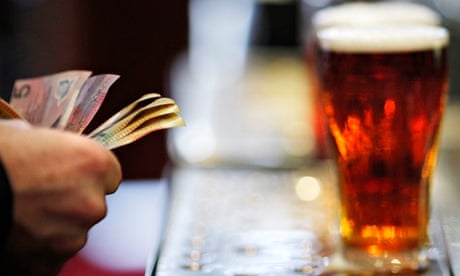A fight for control of the world's beer industry appeared on the verge of breaking out as UK-based SABMiller, the world's second-largest brewer, became the latest London-listed company to be eyed up for takeover.
Shares in the maker of Peroni, Grolsch and Miller Lite soared on the London stock exchange by almost 10% on Monday, pushing the company's value up to £55bn as traders sensed it had become more vulnerable to a takeover by its larger rival, Anheuser-Busch InBev, the owner of Budweiser.
The frenzy followed the collapse of SAB's efforts to buy rival Heineken – a deal that had been viewed by the City as a possible defence against a foreign takeover.
In what appeared to be an unambiguous rejection of SAB's approach to Heineken, the Dutch company said: "The Heineken family has informed SABMiller … of its intention to preserve the heritage and identity of Heineken as an independent company. The Heineken family and Heineken NV's management are confident that the company will continue to deliver growth and shareholder value."
The snub immediately revived speculation that SAB would become a takeover target itself, especially as one of the potential barriers to it being swallowed by its larger rival had been removed.
And the Wall Street Journal reported that AB InBev was talking to banks about raising finance for an acquisition, citing a possible £75bn price tag.
Eddy Hargreaves, an analyst with investment bank Canaccord Genuity, wrote in a note to clients: "The press leak and seeming misjudgment by SABMiller in making its approach put SABMiller's management in an uncomfortable position. The Heineken move appears motivated to a significant degree by defensive thinking – not necessarily at the top of its shareholders' agenda. That SABMiller's inorganic options have been so publicly lessened puts [AB InBev] in an even stronger position, should it choose to make a move on SABMiller."
A tie-up between the world's two largest brewers has been rumoured for years, but the speculation has been revived by the surge in international mergers this year. The Journal added that AB InBev was not in active discussions with SABMiller, but was attempting to line up financing before making a formal approach. Both companies declined to comment.
However, other analysts said SABMiller might now turn its attention on trying to take over Castel, the 80%-family owned French beer and wine group, in which it already owns a 20% stake.
Jonathan Fyfe, an analyst at Mirabaud Securities, said such a deal would require taking on significant debt for SAB: "It would be quite a big deal for SAB to take control of [Castel]. It would involve leveraging up, which might put [AB] InBev off."
SABMiller declined to comment on its future intentions, but a company insider said: "We look at a lot of things a lot of the time. We have a corporate finance team looking at these things all the time. It may be that there is a further acquisition on the horizon, maybe not. But it will have to be value-enhancing for shareholders."
Bankers say a merger with SABMiller would help fix AB InBev's reliance on the US, which is suffering from a slowdown in beer drinking. SABMiller operates in many fast-growing markets – especially in its home market of Africa where its rumoured suitor is virtually unknown.
The origins of SABMiller "lie in the Johannesburg gold rush of 1886", the company's corporate history says, as "digging for gold under Africa's sun was thirsty work, and enterprising brewers seized the opportunity to refresh the booming population".
Following the collapse of apartheid, the company acquired 10 breweries in six countries over three years. In 1999, it switched the primary listing for its shares from Johannesburg to London to improve its access to international markets and raise capital to fuel further expansion.

Comments (…)
Sign in or create your Guardian account to join the discussion